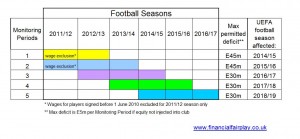Well, not exactly; more like “borrowing” an old but still functional squirt gun that your little brother picked up for free from a garage sale, and using that to annoy its previous owner in every way possible for an entire year. Here’s my quick pre-apology to all Manchester City fans, and to Frank Lampard for bringing up events involved around him so often in this blog.
In July 2014, it was announced that Frank Lampard signed a two-year contract to New York City F.C., having been released as a free agent from his previous club Chelsea F.C.; a few weeks later, it was further announced that he would be on loan to Manchester City F.C. until the start of the Major League Soccer (MLS) season 2015. Since then, Lampard has been a delivering man to the Citizens; 5 league goals, four of which were either equalizers or winners, including that late equalizer against his old club, Chelsea. He’s been quoted as a huge positive influence by a number of his teammates, and his presence has clearly grown on the Citizen fans.
Lampard After His Equalizer Against Chelsea
Now, with his supposed “loan-out” period close to expiration, Manchester City recently stated that they didn’t loan out Lampard at the first place; rather, they signed him for a one-year contract with an agreement to sign a two-year contract to New York City after the end of season 2014-15 of the Premier League. Further questions have been raised on the intentions behind the initial announcement, including the possible breaching of the Financial Fair Play (FFP), a regulation implemented by UEFA in order to prevent overspending amongst European football clubs. Manchester City authorities were quick in this regard, insisting that they have been fully paying Lampard’s wages from the start, and the situation does not affect the current expenditure of the club in any way.
 The Net Expenditure Cap Under FFP
The Net Expenditure Cap Under FFP
On surface, such explanation to dissociate Lampard’s situation from the issue of FFP sounds plausible, given that the club were paying all his wages anyway. But on the other hand, it does raise an issue that is a tad more problematic than just the situation itself; for it is tied to the controversial methods that Manchester City has been applying to manage their finances under the sanction of the FFP. Due to a massive spending spree in the last number of seasons, Manchester City has been under financial restrictions starting this season, including fines, salary caps, net transfer fee caps, and further limitations to players allowed to play during this season. However, the Citizens have been finding ways to fund their bloated salaries through questionable means, including the shifting of over a hundred staff members to be paid through unknown third party companies, which are likely owned by the owner of the club. This, combined with the fact that their annual reports show an unspecified “other commercial activity” revenue of over 100 million pounds as its highest revenue source, has raised questions whether the FFP truly matters for clubs like Manchester City; clubs that can route their revenues and expenditures through other football or non-football facilities outside Europe that the club owners are associated with. Lampard’s case, although apparently unproblematic on its own, is a mere spotlight to the rest of the dodgier methods the club has been using to resolve their issue with the FFP.
It is a touchy subject – the UEFA would undoubtedly be aware of this issue, but at the same time it would be difficult for them to sanction such indirect ways of expenditures from certain football clubs. As it stands, Manchester City are doing a “fair game” outside the pitch; should this be viewed in similar ways to the element of realism and injustice that football portrays inside the pitch? Or should this be viewed as highly detrimental to the game of football, enough to warrant a heavier sanction at the risk of legal conflict between the football community and the multi-billionaire club owners?
I don’t have an answer.
Images from:
http://www.financialfairplay.co.uk/financial-fair-play-explained.php
http://www.telegraph.co.uk/sport/football/competitions/premier-league/11111945/Manchester-City-1-Chelsea-1-Frank-Lampard-comes-off-the-bench-to-upset-former-club-and-save-the-champions.html

